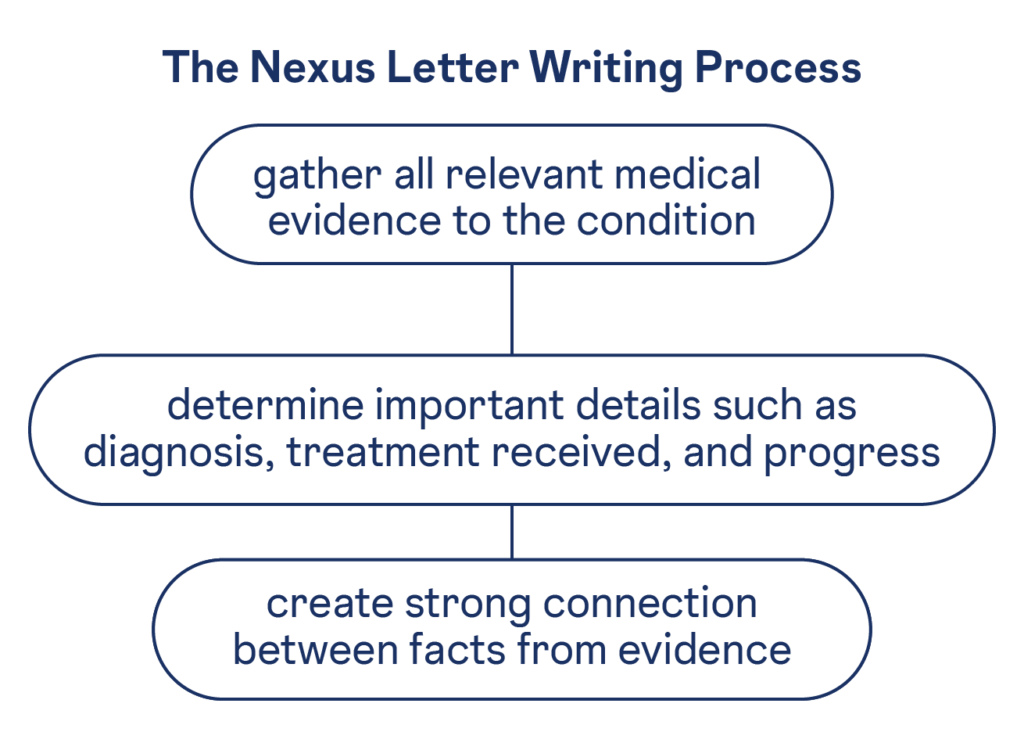Ever stared at a maze, knowing you need to reach the center but unsure where to start? That’s how many veterans feel when tackling their Nexus Letters. These crucial documents are like compasses in the labyrinth of VA disability claims. Why are Nexus Letters so significant?
In essence, Nexus Letters connect the dots between military service and current medical conditions. It’s your ticket for receiving VA benefits – an affirmation from a doctor that says “Yes! Your service caused this health issue.” Sounds simple enough, right?
But here’s where it gets tricky: Writing one is no walk in the park. Knowing who can write them or what they should contain can leave even seasoned vets scratching their heads.
Stick around with us as we delve deeper into how a well-crafted Nexus Letter can be your ticket to securing those deserved disability benefits and making progress on previously denied claims.
Understanding Nexus Letters

A nexus letter, at its core, is a document that creates a bridge between your military service and your current medical condition. It’s like the missing piece of the puzzle in many VA disability claims.
In this realm of veterans’ benefits, understanding what a nexus letter is becomes paramount. But why so? Because it plays an instrumental role in substantiating your claim for disability compensation from Veterans Affairs (VA).
Defining Nexus Letters
The crux of any nexus letter lies in its ability to effectively link two critical elements – a veteran’s military service and their current medical conditions. This connection or ‘nexus’, hence gives the name ‘Nexus Letter’. Think about it as tying together two ends of evidence: one being proof of an incident during military service leading to injury or illness (Key Stat 1), and another signifying how that specific event has resulted into health issues you’re facing now (Key Stat 2).

A good nexus letter should effectively link a veteran’s military service and their current medical conditions.
To add more depth to this concept, consider our body systems functioning akin to well-oiled machines with each part playing its role seamlessly. However when damage occurs due to unforeseen circumstances such as war-time injuries or exposure to harmful substances during active duty, things can go awry much later down the line.
The Importance of Nexus Letters for VA Claims

Nexus letters hold significant weightage when navigating through VA claims because they offer compelling supporting evidence directly linking past incidents experienced while serving our nation with present health concerns. Disability benefits are indeed, a way for the country to show its gratitude towards our brave veterans. However, obtaining these can sometimes become complex without a nexus letter in hand.
A well-articulated nexus letter from a credible source can make all the difference when trying to get VA disability compensation. After all, isn’t it more logical that an event occurred during military service would be connected to health issues later on?
Key Takeaway:
Grasping the concept of a Nexus Letter is key for successful VA disability claims. This document bridges your military service and current health issues, tying together two crucial pieces of evidence. A well-drafted letter can simplify the process, providing strong support to link past service-related incidents with present health conditions.
When and Why to Use Nexus Letters
Using nexus letters can be a game-changer for your VA claim. When is it the proper moment, and why should you utilize them? The answer lies in understanding their power to establish service connection.

Secondary Conditions and Nexus Letters
Nexus letters aren’t just useful; they’re crucial when it comes to secondary conditions. A secondary condition, as the name suggests, is a health issue that arises as an outcome of another service-connected condition.
The link between your military service and this secondary health condition may not always be apparent. This situation calls for compelling evidence – precisely what a well-crafted nexus letter provides.

Previously Denied Claims and Nexus Letters
If you’ve had disability claims denied in the past, don’t lose heart. Your fight isn’t over yet – let’s bring out the big guns with nexus letters.
A comprehensive nexus letter can play a pivotal role in getting those previously denied claims reconsidered by adding weight to your assertion of service connection.
- An estimated one-fourth (Stat 3:) of veterans have seen their claims dismissed because they lacked strong medical evidence,
- Your chances for rating increase are four times higher if you submit a nexus letter with your claim (Stat 4:).
To sum up, whether you’re dealing with secondary conditions or trying to overturn denied claims, nexus letters can make all the difference. So why not use them when they can be so helpful?
The Process of Writing Nexus Letters

Writing nexus letters is a process that demands both medical expertise and an understanding of military service-related health conditions. To begin, it’s essential to gather all relevant current medical records related to the veteran’s condition.
This initial step helps in forming a comprehensive view of the situation before we even start writing the nexus letter. From these documents, crucial details such as diagnosis, treatments received, and progress can be extracted. These are not just mere words on paper but powerful pieces of evidence backing up your VA disability claim.
A well-written nexus letter doesn’t stop at stating facts; it makes strong connections between those facts. For instance, it should clearly establish how military service has contributed to or aggravated existing medical conditions – from post-traumatic stress disorder to physical injuries.
Mental Health Considerations

Nexus letters written for mental health disorders require special attention due to their complex nature. Post-traumatic stress disorder (PTSD), for example, may develop years after serving and its symptoms might fluctuate over time, making direct connection with service difficult.
In cases like this, writing a persuasive PTSD Nexus Letter requires a detailed review of the veteran’s entire military history along with his/her psychological evaluations over time. It’s about painting a complete picture using small strokes – each one significant in portraying veterans’ struggles accurately through paperwork.
Who Can Write Nexus Letters?
The question of who can write nexus letters is crucial for veterans seeking to strengthen their VA disability claims. Typically, the best candidates are medical providers who have an understanding of your health condition and military service.

Nexus letters carry more weight when they’re written by doctors or licensed psychologists familiar with a veteran’s current medical conditions and history. They have the ability to make connections between a veteran’s military service and their current health issues effectively.
Not just any doctor will do though; you need one that understands how these letters function within the VA system. Some professionals specialize in writing nexus letters because they understand exactly what the Veterans Affairs office is looking for.
In addition, services like Attain Med Group offer help to veterans navigating this process. Their team consists of experts experienced in writing effective nexus letters, providing key supporting evidence needed for successful disability claims.
What Makes A Qualified Medical Provider?
A qualified provider isn’t just someone with a license; it requires expertise specific to assessing injuries or illnesses related to military service.
To ensure your letter holds up under scrutiny from Veterans Affairs, choose someone well versed in both diagnosing conditions common among veterans such as post-traumatic stress disorder (PTSD) and tying them back directly to events during active duty times.
Selecting The Right Doctor For Your Letter
You want not only a professional but also someone empathetic towards your situation – dealing with physical or mental health struggles is challenging enough without feeling misunderstood by those tasked with helping you receive VA benefits you deserve.
The Cost of Nexus Letters
Veterans frequently inquire, “What is the expenditure for a nexus letter?” Unfortunately, there isn’t an all-encompassing response. The price can vary based on several factors.
Firstly, it depends on who writes your nexus letter. If you’re lucky enough to have an understanding medical provider familiar with VA disability claims and willing to write one for free or at low cost – that’s great. However, this may not always be the case.
Finding Professional Nexus Letter Services

If you need professional help, expect costs associated with these services. Some professionals charge flat rates while others bill by hour. And remember: higher prices don’t always guarantee better quality letters.
You also have options like Attain Med Group where we work diligently in providing top-notch service without breaking your bank. We make sure our pricing remains affordable and transparent so there are no surprise charges.
Paying for Quality Over Quantity
A cheap nexus letter may seem appealing but beware of its potential drawbacks. Remember what they say about paying peanuts? You end up getting monkeys. It could lack essential details or fail to establish a strong connection between your military service and current health condition – which is critical in winning your claim.
In conclusion (but wait…we said no conclusions.), when considering the costs involved in obtaining a professionally written nexus letter from Attain Med Group keep this analogy in mind: A well-crafted nexus letter is like a master key. It can unlock doors to VA disability benefits you rightfully deserve.
Establishing Service Connection through Medical Evidence

If you’re a veteran seeking VA disability benefits, understanding how to establish service connection using medical evidence is crucial. It’s not just about proving that you have a current health issue; it’s also about showing the link between your military service and this condition.
The Role of Medical History in Nexus Letters
Your medical history plays an essential part in this process. It can offer insights into your past and present health conditions, providing the much-needed context for VA claims evaluators. They’ll look at records including doctors’ notes, hospital reports, test results – anything that might hint at or prove a relationship between your time served and the illness or injury you’re dealing with now.
A vital piece of supporting evidence is what we call ‘Nexus letters’. These are documents written by healthcare providers – typically those who know your case well. A compelling nexus letter does more than simply outline symptoms; it connects them directly to incidents during active duty.
For instance, if you developed post-traumatic stress disorder (PTSD) following combat exposure but were only diagnosed after leaving the military service – don’t worry. Your therapist could write a nexus letter stating their professional opinion on why they believe your PTSD is related to specific traumatic events from when you served.
This goes beyond mere assumption though: they need concrete reasoning based on existing literature or personal observations over sessions with patients like yourself. Their expert perspective combined with references to scientific studies enhances credibility while offering stronger backing for assertions made within these letters.
In conclusion? For successful claim submissions… Go historical.
FAQs in Relation to Nexus Letters
1. What is a nexus letter?
A nexus letter is a document written by a medical professional that links your military service to your current health condition, crucial for VA disability claims.
2. How much does a VA nexus letter cost?
The cost of getting a Nexus Letter can vary widely. It depends on the complexity of the case and the doctor’s fee structure.
3. What kind of doctor writes a Nexus letter?
Nexus letters are typically penned by physicians who are well-acquainted with your medical history and familiar with Veterans Affairs requirements.
4. Where can I find Nexus letters?
You get them from healthcare providers like doctors or psychologists who know about you medically. There’re also services online that help veterans get one.
Conclusion
Navigating Nexus Letters isn’t a walk in the park. But, you’ve now got a compass guiding your path.
Remember, these letters are pivotal in connecting military service to current health conditions. They can make or break VA disability claims and provide substantial help for previously denied cases.
You know that writing them demands precision and medical expertise. Only certain professionals like doctors or licensed psychologists can pen down these crucial documents effectively.
Bear in mind the potential costs but remember their value is priceless when it comes to securing deserved benefits from Veterans Affairs.
With knowledge on how to establish service connection through proper medical evidence, including meticulous medical history records, your journey becomes clearer than ever before.
In this complex labyrinth of veterans’ disability compensation process, Nexus Letters serve as both guideposts and gateways towards rightful benefits earned by brave servicemen and women.

